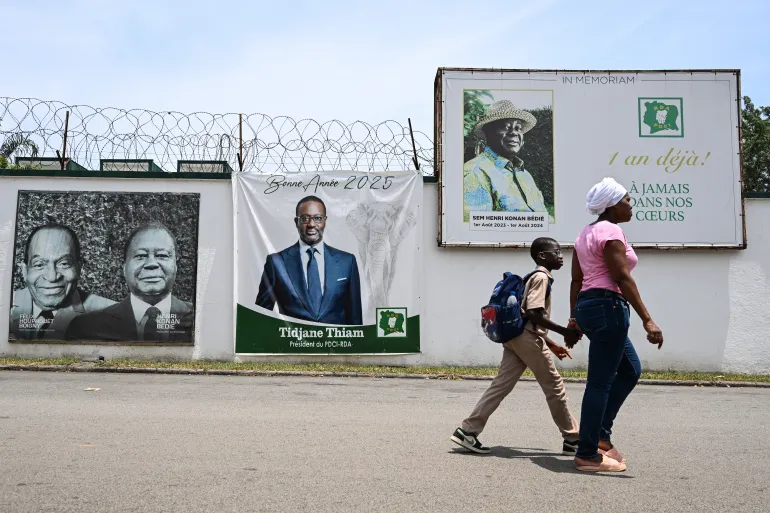
Wafricnews - June 5, 2025
Abidjan, Côte d’Ivoire – In a move raising alarms across the region, four major opposition figures in Côte d’Ivoire have been barred from contesting the upcoming October 25 presidential election, further shrinking political space in a country still haunted by memories of civil unrest, coups, and contested ballots.
Among those struck from the final electoral register is Tidjane Thiam, leader of the historic Democratic Party of Côte d’Ivoire (PDCI) and widely viewed as the most credible challenger to longtime incumbent President Alassane Ouattara.
“My elimination from the electoral list is a sad but eloquent example of Côte d’Ivoire’s drift towards a total absence of democracy,” Thiam declared in a statement on Wednesday.
The Independent Electoral Commission (CEI) confirmed this week that no revision of the electoral roll will take place before the vote—a departure from precedent and a blow to any hopes of electoral inclusivity. In 2020, a voter list update was carried out months ahead of polling.
Thiam’s disqualification stems from a controversial court ruling in April, which deemed him ineligible based on his former French citizenship. Though Thiam renounced the nationality in March and was born in Côte d’Ivoire, authorities claim he no longer meets the criteria to stand for office.
Opposition Silenced, Judiciary Questioned
Thiam is not alone. Also excluded from the ballot are:
- Laurent Gbagbo, former president and figurehead of the African People’s Party-Côte d’Ivoire (PPA-CI)
- Charles Blé Goudé, Gbagbo’s political ally and former youth leader, once tried at the International Criminal Court
- Guillaume Soro, ex-prime minister and rebel leader, currently in exile after being sentenced in absentia to life imprisonment over coup allegations
All four have also been stripped of voting rights—a clear indication, critics say, of coordinated legal and administrative efforts to sideline influential opposition voices.
The government insists there has been no political interference, maintaining that all decisions stem from an independent judiciary. But international observers and local civil society groups are unconvinced.
“This is a serious violation of Côte d’Ivoire’s international commitments,” said Thiam’s lawyer, Mathias Chichportich, who has taken the case to the UN Human Rights Committee.
The PPA-CI described the exclusions as a deliberate rejection of dialogue, with party Secretary-General Jean-Gervais Tcheide accusing authorities of choosing “force over reason.”
“We’re not going to let them do it,” Tcheide warned.
Concerns Mount Over Electoral Integrity
Meanwhile, the ruling Rally of Houphouëtists for Democracy and Peace (RHDP) has remained largely silent on the growing backlash. President Ouattara, who has been in power since 2011, is on the electoral register but has yet to declare whether he will pursue a fourth term—a decision that could further inflame tensions.
Ouattara previously won the 2015 and 2020 elections with over 80% of the vote, results widely disputed by opposition parties and international monitors alike.
Adding to concerns is the lack of electoral reform ahead of the 2025 vote. The CEI has confirmed that the voter list will remain frozen, meaning newly eligible voters—including millions of Ivorian youth—will be left out. The final list currently includes 8.7 million registered voters, in a country of over 30 million people, nearly half of whom are under 18.
Opposition voices still on the ballot include former First Lady Simone Ehivet Gbagbo, now leading a coalition that has condemned the political climate as unfit for a “peaceful, credible election.”
“The conditions are not in place for calm or fairness,” Simone Gbagbo said this week.
A Familiar Path to Crisis?
With opposition candidates blocked, electoral reforms stalled, and public trust waning, Côte d’Ivoire may once again be heading toward a fragile and contested vote. For many Ivorians, the current trajectory is an unsettling echo of the past—a democracy in retreat and power increasingly consolidated through technical disqualifications and legal maneuvers.
As October approaches, the question remains: Will the ballot box be a path to peace—or another trigger for unrest?
By WafricNews Desk.
By WafricNews Desk.


Comment
To post a comment, you have to login first
LoginNo Comments Yet...